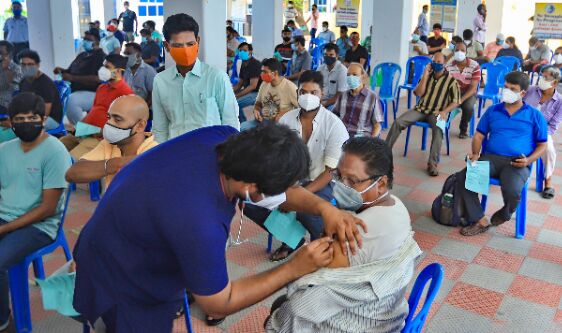Much needed change

After much controversy and repeated political blame games, the vaccination plan for India has once again shifted. Now, the Centre will once again take a leading role in India's inoculation plans. Under the old guidelines, the states would have to directly negotiate with vaccine makers to get the required vaccines to innoculate people aged from 18 to 44. It was revealed that the states would not only be competing for these vaccines with each other but also the private sector which would also procure vaccines from the set state quota. Now, the Centre will be taking over from the states in procuring 75 per cent of all available vaccines with the other 25 per cent still being left up to private interests. The vaccines that the Centre will procure will be used to innoculate people aged 18 and older for free. In private hospitals, states are supposed to monitor that the service charge does not cross Rs 150 over the fixed price of the vaccine. It is hard to emphasise how significant this shift is. Under the previous 'liberalised' rules, states and private organisations would have gotten caught up in a meaningless competition of procuring a limited supply which would only serve to benefit vaccine makers. The old policy also allowed these vaccine makers to seek 'super profits' as the pricing cap was lifted. The policy ultimately proved unsuccessful even before it could show itself to be unsustainable because even the Indian states that did try to separately procure vaccines were shut out by vaccine makers who were too busy with existing contracts or insisted on dealing only with the Central Government. As such, several states have 'thanked' the Centre for 'heeding' their requests for the previously irrational vaccine policy to be scrapped. The Centre maintains that the liberalised vaccine policy was only introduced after several states demanded permission to procure their own vaccine supply. Regardless of the sequence of events that led to it, the new vaccine policy has been seen as generally favourable as it comes at a critical time. India is once again in between waves with a moment of calm as case counts steadily go down and recovery rates rise. That said, experience with the waves has informed that such lulls are always temporary and the disease always returns when left to its own devices. Therefore, such periods of lull are the ideal time to pick up the pace of the vaccination campaign. After facing backlash on India's vaccine shortages, the Centre has responded by saying they'll be enough vaccines in India by year-end to at least vaccinate every adult in the country. While this is a daunting task and there are doubts over whether such a promise can be fulfilled in such a short period, it is nevertheless clear that the Centre intends to finally face the pathogen with vaccines 'on a war footing'. But while the policy has been widely approved, there are a few that have raised concerns. First, private hospitals such as Fortis have come forth saying that the capping of service charges at Rs 150 can be problematic as it will not cover charges for offsite vaccination camps which involves expenses for ambulances, transport, etc. Second, some have raised concern with the still existing private quota. While the Centre has said that regardless of socioeconomic status the vaccines will be given free to one and all above the age of 18, the fact that those using the private sector are still paying distorts a fundamental effort that is ongoing in the world. That is the effort to declare vaccines as a universal right, something everyone gets regardless of their status. The idea is that vaccines should not be something people are charged for. Vaccine makers revenues are no doubt important but there must be other ways for the companies to sustain their profit stream by charging people for what should be a public good. This isn't about the pricing of the vaccine, though the pricing matters as well. It is about putting any price on a vaccine and also separating the quota of those who are privileged enough to pay for access to their vaccines and those who must rely on the government. It is important to note that coming up with public healthcare solutions during this pandemic will not simply just have consequences for this pandemic. Decisions made now will serve as a precedent for necessary changes in the healthcare system. It is therefore important for the government to take note and only act in the absolute interest of the people of India without regarding the demands of private interests.



